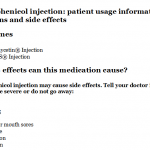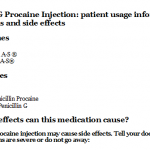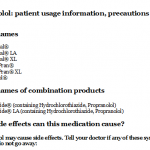
Verapamil: patient usage information, precautions and side effects
Tuesday, May 30, 2017 by Gregory Van Dyke
http://www.naturalnewsreference.com/2017-05-30-verapamil-patient-usage-information-precautions-and-side-effects.html

Verapamil: patient usage information, precautions and side effects
Brand names
Calan®
Calan® SR
Covera® HS
Isoptin®
Verelan®
Verelan® PM
Brand names of combination products
Tarka® (containing trandolapril and verapamil)
Other names
Iproveratril Hydrochloride
What side effects can this medication cause?
Verapamil may cause side effects. Tell your doctor if any of these symptoms are severe or do not go away:
-
constipation
-
heartburn
-
dizziness or lightheadedness
-
headache
Some side effects can be serious. If you experience any of the following symptoms, call your doctor immediately or get emergency medical treatment :
-
swelling of the hands, feet, ankles, or lower legs
-
difficulty breathing or swallowing
-
slow heartbeat
-
fainting
-
blurred vision
-
rash
-
nausea
-
extreme tiredness
-
unusual bleeding or bruising
-
lack of energy
-
loss of appetite
-
pain in the upper right part of the stomach
-
yellowing of the skin or eyes
-
flu-like symptoms
-
fever
If you experience a serious side effect, you or your doctor may send a report to the Food and Drug Administration’s (FDA) MedWatch Adverse Event Reporting program online (http://www.fda.gov/Safety/MedWatch) or by phone (1-800-332-1088).
Why is this medication prescribed?
Verapamil is used to treat high blood pressure and to control angina (chest pain). The immediate-release tablets are also used alone or with other medications to prevent and treat irregular heartbeats. Verapamil is in a class of medications called calcium-channel blockers. It works by relaxing the blood vessels so the heart does not have to pump as hard. It also increases the supply of blood and oxygen to the heart and slows electrical activity in the heart to control the heart rate.
High blood pressure is a common condition and when not treated, can cause damage to the brain, heart, blood vessels, kidneys and other parts of the body. Damage to these organs may cause heart disease, a heart attack, heart failure, stroke, kidney failure, loss of vision, and other problems. In addition to taking medication, making lifestyle changes will also help to control your blood pressure. These changes include eating a diet that is low in fat and salt, maintaining a healthy weight, exercising at least 30 minutes most days, not smoking, and using alcohol in moderation.
How should this medicine be used?
Verapamil comes as a tablet, an extended-release (long-acting) tablet, and an extended-release (long-acting) capsule to take by mouth. The regular tablet is usually taken three to four times a day. The extended-release tablets and capsules are usually taken once or twice a day. Take verapamil at around the same time(s) every day. Certain verapamil products should be taken in the morning and others at bedtime. Ask your doctor what the best time is for you to take your medication. Follow the directions on your prescription label carefully, and ask your doctor or pharmacist to explain any part you do not understand. Take verapamil exactly as directed. Do not take more or less of it or take it more often than prescribed by your doctor.
Swallow the extended-release tablets and capsules whole. Do not chew or crush them. Ask your pharmacist if the tablets may be split in half, as the instructions vary by product.
If you can not swallow the extended-release capsules you may carefully open the capsule and sprinkle the entire contents onto a spoonful of applesauce. The applesauce should not be hot, and it should be soft enough to be swallowed without chewing. Swallow the applesauce immediately without chewing, and then drink a glass of cool water to make sure that you have swallowed all of the medicine. Do not store the mixture for future use.
Your doctor will probably start you on a low dose of verapamil and gradually increase your dose.
Verapamil controls arrhythmias, high blood pressure, and angina but does not cure these conditions. Continue to take verapamil even if you feel well. Do not stop taking verapamil without talking to your doctor.
Other uses for this medicine
Verapamil is also sometimes used to treat certain other heart problems. Talk to your doctor about the risks of using this medication for your condition.
This medication is sometimes prescribed for other uses; ask your doctor or pharmacist for more information.
What special precautions should I follow?
Before taking verapamil,
-
tell your doctor and pharmacist if you are allergic to verapamil, any other medications, or any ingredients in verapamil. Ask your pharmacist for a list of the ingredients.
-
tell your doctor and pharmacist what prescription and nonprescription medications, vitamins, and nutritional supplements you are taking or plan to take. Be sure to mention any of the following: alpha blockers such as prazosin (Minipress); antifungals such as itraconazole (Onmel, Sporanox) and ketoconazole (Nizoral); aspirin; beta blockers such as atenolol (Tenormin, in Tenoretic), metoprolol (Lopressor, Toprol XL, in Dutoprol), nadolol (Corgard, in Corzide), propranolol (Inderal, Innopran, in Inderide), and timolol (Blocadren, in Timolide); carbamazepine (Carbatrol, Epitol, Equetro, Tegretol); cimetidine (Tagamet); clarithromycin (Biaxin, in Prevpac); cyclosporine (Neoral, Sandimmune); digoxin (Lanoxin); disopyramide (Norpace); diuretics (”water pills”); erythromycin (E.E.S., Eryc, Erythrocin); flecainide; certain HIV protease inhibitors such as indinavir (Crixivan), nelfinavir (Viracept), and ritonavir (Norvir, in Kaletra); quinidine (in Nuedexta); lithium (Lithobid); medications to treat high blood pressure; nefazodone; phenobarbital; pioglitazone (Actos, in Duetact, in Oseni); rifampin (Rifadin, Rimactane); telithromycin (Ketek); and theophylline (Theochron, Theolair, Uniphyl). Your doctor may need to change the doses of your medications or monitor you carefully for side effects. Many other medications may also interact with verapamil, so be sure to tell your doctor about all the medications you are taking, even those that do not appear on this list.
-
tell your doctor what herbal products you are taking, especially St. John’s wort.
-
tell your doctor if you have or have ever had narrowing or blockage of your digestive system or any other condition that causes food to move through your digestive system more slowly; heart failure; heart, liver, or kidney disease; muscular dystrophy (inherited disease that causes gradual weakening of muscles); or myasthenia gravis (condition that causes certain muscles to weaken).
-
tell your doctor if you are pregnant, plan to become pregnant, or are breast-feeding. If you become pregnant while taking verapamil, call your doctor.
-
if you are having surgery, including dental surgery, tell your doctor or dentist that you are taking verapamil.
-
talk to your doctor about the safe use of alcoholic beverages during your treatment with verapamil. Verapamil may cause the effects of alcohol to be more severe and longer-lasting.
What special dietary instructions should I follow?
Talk to your doctor about eating grapefruit or drinking grapefruit juice while taking this medicine.
What should I do if I forget a dose?
Take the missed dose as soon as you remember it. However, if it is almost time for the next dose, skip the missed dose and continue your regular dosing schedule. Do not take a double dose to make up for a missed one.
Why is this medication prescribed?
How should this medicine be used?
What special precautions should I follow?
What special dietary instructions should I follow?
What should I do if I forget a dose?
What side effects can this medication cause?
What should I know about storage and disposal of this medication?
What other information should I know?
Tagged Under: Tags: chemical medicine, medication, Pharma, Prescription Medicine





